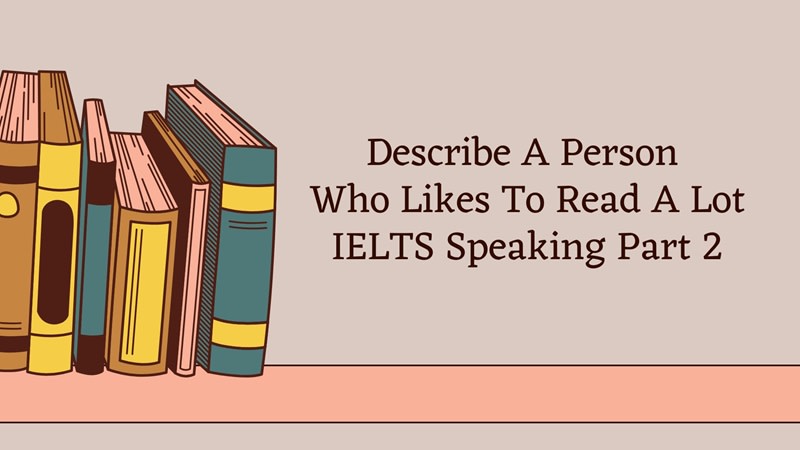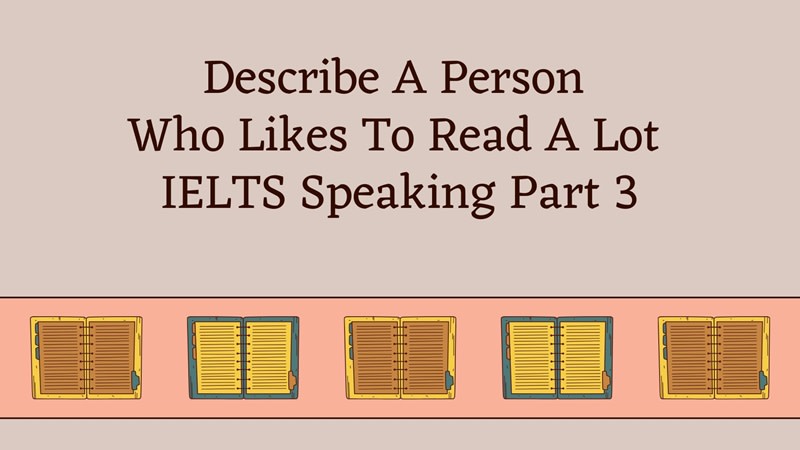Trong phần thi IELTS Speaking, bạn thường được yêu cầu miêu tả một người cụ thể và mở rộng thành những cuộc thảo luận sâu hơn. Một trong những chủ đề khá phổ biến là Describe a person who likes to read a lot. Đây là cơ hội để bạn luyện cách kể chuyện, miêu tả tính cách, thói quen, đồng thời vận dụng vốn từ vựng về sách, sở thích và giáo dục. Bài viết này sẽ giúp bạn phân tích đề, xây dựng dàn ý, tham khảo bài mẫu cũng như từ vựng hữu ích để tự tin hơn khi bước vào kỳ thi IELTS.
Tìm hiểu lệ phí thi IELTS, hướng dẫn thanh toán và tối ưu điểm số với IELTS One Skill Retake - Thi lại 1 kỹ năng.
1. Phân tích chủ đề Describe a person who likes to read a lot - IELTS Speaking Part 2
Khi gặp đề bài này, bạn có thể chọn miêu tả cha mẹ, thầy cô, bạn thân, anh/chị, hoặc một nhân vật nổi tiếng có sở thích hoặc thói quen đọc sách thường xuyên.
Cue card: Describe a person who likes to read a lot
You should say:
Who this person is
How you knew him/her
What he/she likes to read
And explain why you think he/she likes to read a lot
Bạn cũng cần lưu ý nhấn mạnh các khía cạnh sau:
Tính cách của người đó: thông minh, ham học hỏi, kiên nhẫn, có trí tưởng tượng phong phú.
Ảnh hưởng đến bạn: truyền cảm hứng cho bạn đọc nhiều hơn, bạn học được sự kiên nhẫn, hoặc mở rộng vốn từ vựng tiếng Anh thông qua việc đọc sách.
Hình thành được mối liên hệ với phần thi IELTS Speaking Part 3: Từ Part 2, bạn có thể dễ dàng triển khai sang các câu hỏi Part 3 về thói quen đọc sách trong xã hội, lợi ích của việc đọc sách so với xem TV, hoặc vai trò của thư viện trong thời đại công nghệ.

2. Dàn ý tham khảo đối với đề Describe a person who likes to read a lot - IELTS Speaking Part 2
Để có một bài nói Part 2 mạch lạc và đầy đủ ý, bạn có thể tham khảo dàn ý sau:
Who this person is/ How you knew him/her
| My mother, an avid reader and probably the biggest bookworm I’ve ever known She’s a high school teacher, so reading is not only part of her job but also her passion. |
What he/she likes to read
| She reads all sorts of materials, ranging from novels and biographies to newspapers and online articles. Her favorites are history books and self-improvement guides She often immersed deeply in a book, completely forgetting the world around her. |
And explain why you think he/she likes to read a lot
| It helps her relax after a long day and, at the same time, broaden her knowledge. She often shares interesting facts or life lessons that she picks up from books, and I find those conversations really inspiring. I couldn't help but feel a bit disheartened by the steep prices. |
Lesson learned | I admire her discipline and curiosity. Thanks to her, I’ve developed a habit of reading English novels to improve my vocabulary and comprehension. In a nutshell, my mother is the kind of person who proves that books can truly change the way we think and live. |
3. Bài mẫu topic Describe a person who likes to read a lot - IELTS Speaking Part 2
Đề bài: Describe a place where you thought things were too expensive
Bài làm mẫu:
I’d like to talk about my mother, who is definitely an avid reader and perhaps the biggest bookworm I’ve ever come across. She’s a high school teacher, so reading is not only integral to her profession but also her lifelong passion.
She reads an incredibly wide range of materials, from novels and biographies to newspapers and online articles. That said, she has a particular penchant for history books and self-improvement guides. I often see her so deeply engrossed in a book that she seems to lose all sense of time and space.
In terms of her reading habits, she usually spends at least an hour before bedtime devouring pages in her room. On weekends, she sometimes heads to the local library, where she can borrow fresh titles and enjoy the serene atmosphere. She also makes good use of her Kindle when we travel, ensuring she never runs out of books to dive into.
The reason she reads so extensively, I think, is that it allows her to unwind after a hectic day while simultaneously expanding her horizons. Quite often, she shares intriguing insights or valuable life lessons from her reading, and I always find those conversations both thought-provoking and inspiring.
Personally, I really admire her discipline and intellectual curiosity. Thanks to her, I’ve cultivated the habit of reading English novels myself, which has been instrumental in enhancing my vocabulary and comprehension skills. All in all, my mother epitomizes the idea that books have the power to reshape the way we think and live our lives.
Vocabulary ghi điểm:
avid reader (n): người đam mê đọc sách
bookworm (n): mọt sách
integral to (adj + prep): thiết yếu, không thể thiếu
penchant for (noun phr.): niềm đam mê, sở thích mạnh mẽ với
engrossed in (adj + prep): say mê, chìm đắm trong
devour pages (verb phr.): đọc ngấu nghiến, rất nhanh và say mê
expand one’s horizons (idiom): mở rộng tầm hiểu biết
intriguing insights (adj + noun): những hiểu biết thú vị
intellectual curiosity (adj + noun): năng lực tò mò
cultivated the habit of: đã nuôi dưỡng thói quen
intriguing insights (adj + noun): những góc nhìn thú vị
thought-provoking (adj): kích thích tư duy
epitomize (v): là hình mẫu, minh chứng rõ ràng cho
reshape the way we think and live our lives: định hình lại cách chúng ta suy nghĩ và sống cuộc sống của chính mình
4. Bài mẫu topic Describe a person who likes to read a lot - Part 3

Câu hỏi: Do you think people of all ages need to read?
Yes, I absolutely believe that reading brings huge benefits to people at any stage of life.
For children, reading books or even comics can fuel their imagination and open the door to knowledge in an independent and enjoyable way, without constant reliance on teachers. It also sharpens their language skills by exposing them to more advanced vocabulary and accurate grammar, while at the same time improving their communication skills through flexible and natural expressions.
When it comes to working adults, reading often serves a more professional purpose. Many people choose materials relevant to their field to stay up-to-date, broaden their skill set, and increase their chances of getting a promotion or a higher salary.
As for the elderly, I once read that keeping a regular reading habit can delay the onset of Alzheimer’s and other cognitive decline. So in a way, reading is not just about knowledge and entertainment, but also a long-term investment in mental health.
Vocabulary ghi điểm:
huge benefits (noun phr.): lợi ích to lớn, rõ rệt
fuel their imagination (verb phr.): khơi dậy/nuôi dưỡng trí tưởng tượng
open the door to knowledge (verb phr.): mở ra cánh cửa tri thức, tạo cơ hội tiếp cận kiến thức
constant reliance (noun phr.): sự phụ thuộc thường xuyên, liên tục
sharpens (v): mài giũa, rèn luyện, cải thiện kỹ năng
more advanced vocabulary (noun phr.): vốn từ vựng nâng cao hơn
flexible and natural expressions (noun phr.): cách diễn đạt linh hoạt và tự nhiên
professional purpose (noun phr.): mục đích liên quan đến công việc/chuyên môn
stay up-to-date (verb phr.): cập nhật kịp thời, nắm bắt thông tin mới nhất
broaden their skill set (verb phr.): mở rộng bộ kỹ năng, nâng cao năng lực
delay the onset (verb phr.): làm chậm sự khởi phát (của bệnh hoặc sự suy giảm)
cognitive decline (noun phr.): sự suy giảm nhận thức, trí tuệ (thường gặp ở tuổi già)
long-term investment in mental health (noun phr.): khoản đầu tư dài hạn cho sức khỏe tinh thần
Câu hỏi: Do you think parents should help their children develop the reading habit from an early age?
Definitely. When parents encourage reading early on, children are far more likely to view it as an enjoyable activity rather than a chore. This early exposure to reading not only boosts cognitive development but also strengthens their language skills, which makes it easier for them to excel academically. Moreover, parents can turn reading into a shared experience and foster a lifelong passion for books by creating a positive reading environment at home.
Vocabulary ghi điểm:
early exposure (noun phr.): sự tiếp xúc sớm, trải nghiệm từ nhỏ
boost (sth) (v): thúc đẩy, cải thiện rõ rệt
cognitive development (noun phr.): sự phát triển nhận thức
excel academically (verb phr.): đạt thành tích vượt trội trong học tập
shared experience (noun phr.): trải nghiệm chung (giữa cha mẹ và con cái)
foster a lifelong passion for books (verb phr.): nuôi dưỡng niềm đam mê sách vở suốt đời
Câu hỏi: What kinds of books are popular in your country?
It really depends on people’s age and gender. When it comes to youngsters, because of the heavy workload and their hectic lifestyles, many of them tend to go for comics, which are easier to digest and take less time to finish. Of course, some also read specialized materials related to their profession.
As for the elderly, they usually pay more attention to their health and well-being, so their reading preferences often revolve around medical care, nutrition, or exercise to maintain longevity. In terms of gender, women often enjoy immersing themselves in romantic novels or cookbooks, while men are more inclined to read newspapers, magazines, or anything related to sports.
Vocabulary ghi điểm:
hectic lifestyles (noun phr.): lối sống bận rộn, dồn dập
go for (sth) (phrasal verb): lựa chọn, ưa thích
easier to digest (adj phr.): dễ đọc, dễ tiếp thu
specialized materials (noun phr.): tài liệu chuyên ngành
well-being (noun): sức khỏe thể chất và tinh thần
maintain longevity (ver): duy trì tuổi thọ, sống lâu khỏe mạnh
immerse themselves in (ver): đắm chìm trong ..
more inclined to (do sth) (adj phr.): có xu hướng, thiên về
5. Từ vựng chủ đề Describe a person who likes to read a lot

Từ vựng chung phổ biến
Từ/ cụm từ vựng | Ý nghĩa | Ví dụ |
|---|---|---|
page-turner | cuốn sách cực kỳ lôi cuốn, khó dừng lại | The novel was such a page-turner that I finished it in two days. |
lifelong learning | học tập suốt đời | Her habit of reading reflects her belief in lifelong learning. |
self-education | tự học, tự bồi dưỡng kiến thức | Through extensive reading, he engaged in self-education beyond school. |
critical thinking | tư duy phản biện | Reading diverse sources improves critical thinking skills. |
literary appreciation | sự cảm thụ văn học | The course aims to develop students’ literary appreciation. |
literary enthusiast
| người đam mê văn học
| My uncle is a literary enthusiast who enjoys poetry and classic novels. |
scholarly inclination | thiên hướng học thuật, ham nghiên cứu
| Her scholarly inclination is reflected in her habit of reading academic journals. |
cognitive development | sự phát triển nhận thức | Extensive reading supports children’s cognitive development. |
Các collocation về chủ đề Describe a person who likes to read a lot
Collocation | Ý nghĩa |
|---|---|
immerse in a book | đắm chìm trong một cuốn sách |
enrich one’s vocabulary | làm giàu vốn từ vựng |
a deeper dive into characters' thoughts | khám phá sâu hơn về suy nghĩ của nhân vật |
visual and auditory elements | các yếu tố thị giác và thính giác |
tops the list of popular reads | đứng đầu danh sách các cuốn sách được yêu thích |
opens up young minds to new ideas | mở ra những ý tưởng mới cho tâm trí trẻ |
deeper human experiences | những trải nghiệm sâu sắc của con người |
interpret literary works | phân tích/giải thích tác phẩm văn học |
gain new perspectives | có thêm góc nhìn mới |
be glued to a book | chăm chú đọc, không rời mắt |
Các Idiom về chủ đề Describe a person who likes to read a lot
Idiom | Ý nghĩa |
|---|---|
hit the books | học tập chăm chỉ, đọc sách nghiêm túc |
read between the lines | đọc ra ý ẩn, hiểu sâu hơn nghĩa bề mặt |
lose oneself in a book | đắm chìm trong việc đọc sách |
an open book | người dễ hiểu, thẳng thắn (hoặc cuốn sách dễ đọc) |
curl up with a book | ngồi/ nằm thoải mái để đọc sách |
food for thought | điều đáng để suy ngẫm |
devour a book | đọc ngấu nghiến, đọc rất nhanh vì hứng thú |
read cover to cover | đọc từ đầu đến cuối không bỏ sót |
soak up knowledge | tiếp thu kiến thức nhanh chóng |
escape into a book | trốn khỏi thực tại bằng cách đọc sách |
Xem thêm chủ đề liên quan:
Describe a person who often buy at the street market at cheaper price - IELTS Speaking Part 2, 3
Tự tin ghi điểm cao trong bài thi IELTS Speaking cùng IDP
Chủ đề Describe a person who likes to read a lot không chỉ giúp bạn rèn luyện kỹ năng miêu tả một nhân vật cụ thể mà còn mở rộng vốn từ vựng về sách, sở thích và giáo dục. Khi trả lời, hãy chú ý xây dựng mạch ý rõ ràng, kết hợp đa dạng các cụm từ và thành ngữ để tạo ấn tượng với giám khảo. Việc luyện tập thường xuyên với dạng đề này sẽ giúp bạn tự tin hơn trong IELTS Speaking, đồng thời thể hiện khả năng sử dụng ngôn ngữ đa dạng và tự nhiên.
Nếu bạn đang lên kế hoạch thi IELTS tại IDP, bạn có thể lựa chọn bài thi IELTS Academic Speaking hoặc IELTS General Speaking, tùy vào nhu cầu và định hướng học tập của bản thân. Bạn cũng đừng quên tìm hiểu về tiêu chí chấm điểm IELTS Speaking, thang điểm IELTS, cũng như cách quy đổi điểm thi IELTS để đặt mục tiêu phù hợp.
Bên cạnh đó, IDP mang đến hệ thống địa điểm thi IELTS trải rộng khắp cả nước, lịch thi linh hoạt và lựa chọn thi IELTS trên máy tính với kết quả nhanh chóng chỉ trong 2 ngày.
Và khi bạn đã sẵn sàng, hãy đăng ký thi IELTS với IDP ngay
